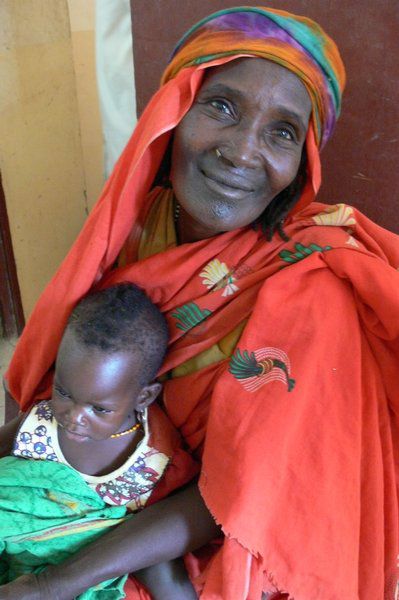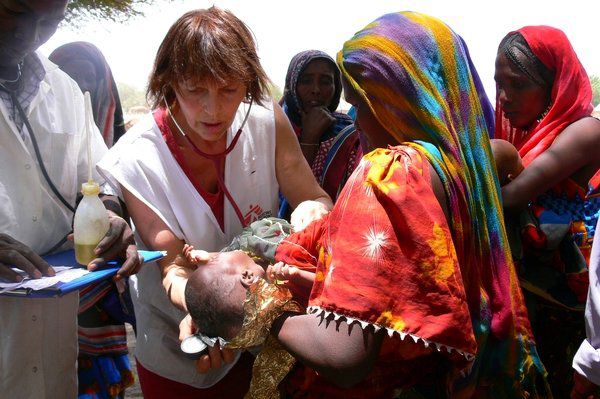As a food crisis in Chad continues to grow, Médecins Sans Frontières (MSF) is expanding the number of emergency malnutrition treatment programs in the country to help curb soaring levels of severe acute malnutrition. Even in a normal year, Chad has one of the highest rates of chronic malnutrition in the world. In early 2012, in some areas of the country, rates of global acute malnutrition as high as 24 percent were reported, among children under the age of five.
Several factors including erratic rainfalls, failed harvests, soaring food and fuel prices, early depletion of food stocks and poor access to healthcare have contributed to the increase of malnutrition rates. In addition, tens of thousands of Chadians working in Libya have fled the violence and returned home, resulting in a loss of income.
In April, MSF opened an inpatient therapeutic feeding center in Biltine town, and opened five outpatient therapeutic feeding centers in outlying areas. To date, 282 children have been admitted to our outpatient centers and 42 critically-ill malnourished children have been treated in inpatient care.
In Biltine, MSF plans to open seven more outpatient therapeutic feeding centers before the peak of the malnutrition season, which begins in July. Marcus BACHMANN is the MSF Project Coordinator in Biltine:
Why are there such alarming rates of malnutrition in Biltine?
February is beginning of the hunger gap in Chad, when families traditionally begin to run out of their food stocks. This year MSF found high rates of severe acute malnutrition rates among children under five, because only 46 percent of the harvest required to feed the population, was harvested, which is well below the average. Many Chadians who worked in Libya also lost their jobs and returned home. Those men have moved to other parts of Chad to find work, but the salaries are much lower, so they are sending home less money.
What has been your biggest challenge so far?
When the ‘lean season’ began earlier in the year, women told us they would walk 15-25 kilometers to a health center and did not receive meaningful health attention for their malnourished children. Many health centers in this district are poorly equipped with poorly qualified staff. As a result, we are now making a huge effort to reach those mothers again and reassure them there is medical treatment for their child; that they will see a doctor or a nurse and they will get help. We need to regain the trust of the mothers in this area and it is a huge job.
How does an outpatient feeding center work?
Our mobile team, made up of one MSF supervisor and nine medical workers, drives out to a local health clinic and sets up their equipment. They spend the day registering children and screening them for malnutrition by weighing them and measuring their arms. The children also undergo an appetite test and a malaria test. They receive a week’s work of therapeutic food, and a blanket and malaria net. The mothers are expected to return on a weekly basis until their child is healthy again.
Children who are very sick are referred to our paediatric ward at the hospital in Biltine town, where we have an intensive care unit to treat severe conditions. These are usually children who, due to the immunodeficiency caused by malnutrition, suffer from additional illnesses, such as respiratory tract infections, diarrhea, or even tuberculosis. They can also be kids who are too weak to eat and have to be fed through a gastric tube.
Are we making a difference?
There are several things that touch me when I see the mothers coming to the feeding centers with their children. They have walked a long distance with a child on their back, in the harshest of conditions and in the hottest temperatures. They tell me they were doubtful that MSF would come back to help them week after week, and they are so delighted their children are finally getting treatment and getting better. We are gaining the trust of the mothers and they are spreading the word about us to other mothers.
What are our plans and what is MSF calling for?
Our emergency intervention in Biltine will run until mid-December. We hope another organization, such as the World Food Program, will begin general food distribution to the population of Biltine as soon as possible.
At MSF’s long-term project in Am Timan, located in Salamat region, in the southeast of the country, malnutrition rates are also escalating at an alarming rate. Between January and April, 2478 children were admitted to ambulatory therapeutic feeding centers – almost twice as many as at the same time last year.
In Yao, in Batha Region, MSF opened a nutrition program in April. 420 children have been admitted so far.
MSF runs a 200-bed pediatric hospital in the town of Massakory in western Chad's Hadjer Lamis region. Currently, 160 children are hospitalized, and cases are both paediatric and nutrition-related.
Last week in Abou Deia a nutrition intervention began where we expect to treat 1000 children.
Several factors including erratic rainfalls, failed harvests, soaring food and fuel prices, early depletion of food stocks and poor access to healthcare have contributed to the increase of malnutrition rates. In addition, tens of thousands of Chadians working in Libya have fled the violence and returned home, resulting in a loss of income.
In April, MSF opened an inpatient therapeutic feeding center in Biltine town, and opened five outpatient therapeutic feeding centers in outlying areas. To date, 282 children have been admitted to our outpatient centers and 42 critically-ill malnourished children have been treated in inpatient care.
In Biltine, MSF plans to open seven more outpatient therapeutic feeding centers before the peak of the malnutrition season, which begins in July. Marcus BACHMANN is the MSF Project Coordinator in Biltine:
Why are there such alarming rates of malnutrition in Biltine?
February is beginning of the hunger gap in Chad, when families traditionally begin to run out of their food stocks. This year MSF found high rates of severe acute malnutrition rates among children under five, because only 46 percent of the harvest required to feed the population, was harvested, which is well below the average. Many Chadians who worked in Libya also lost their jobs and returned home. Those men have moved to other parts of Chad to find work, but the salaries are much lower, so they are sending home less money.
What has been your biggest challenge so far?
When the ‘lean season’ began earlier in the year, women told us they would walk 15-25 kilometers to a health center and did not receive meaningful health attention for their malnourished children. Many health centers in this district are poorly equipped with poorly qualified staff. As a result, we are now making a huge effort to reach those mothers again and reassure them there is medical treatment for their child; that they will see a doctor or a nurse and they will get help. We need to regain the trust of the mothers in this area and it is a huge job.
How does an outpatient feeding center work?
Our mobile team, made up of one MSF supervisor and nine medical workers, drives out to a local health clinic and sets up their equipment. They spend the day registering children and screening them for malnutrition by weighing them and measuring their arms. The children also undergo an appetite test and a malaria test. They receive a week’s work of therapeutic food, and a blanket and malaria net. The mothers are expected to return on a weekly basis until their child is healthy again.
Children who are very sick are referred to our paediatric ward at the hospital in Biltine town, where we have an intensive care unit to treat severe conditions. These are usually children who, due to the immunodeficiency caused by malnutrition, suffer from additional illnesses, such as respiratory tract infections, diarrhea, or even tuberculosis. They can also be kids who are too weak to eat and have to be fed through a gastric tube.
Are we making a difference?
There are several things that touch me when I see the mothers coming to the feeding centers with their children. They have walked a long distance with a child on their back, in the harshest of conditions and in the hottest temperatures. They tell me they were doubtful that MSF would come back to help them week after week, and they are so delighted their children are finally getting treatment and getting better. We are gaining the trust of the mothers and they are spreading the word about us to other mothers.
What are our plans and what is MSF calling for?
Our emergency intervention in Biltine will run until mid-December. We hope another organization, such as the World Food Program, will begin general food distribution to the population of Biltine as soon as possible.
At MSF’s long-term project in Am Timan, located in Salamat region, in the southeast of the country, malnutrition rates are also escalating at an alarming rate. Between January and April, 2478 children were admitted to ambulatory therapeutic feeding centers – almost twice as many as at the same time last year.
In Yao, in Batha Region, MSF opened a nutrition program in April. 420 children have been admitted so far.
MSF runs a 200-bed pediatric hospital in the town of Massakory in western Chad's Hadjer Lamis region. Currently, 160 children are hospitalized, and cases are both paediatric and nutrition-related.
Last week in Abou Deia a nutrition intervention began where we expect to treat 1000 children.



